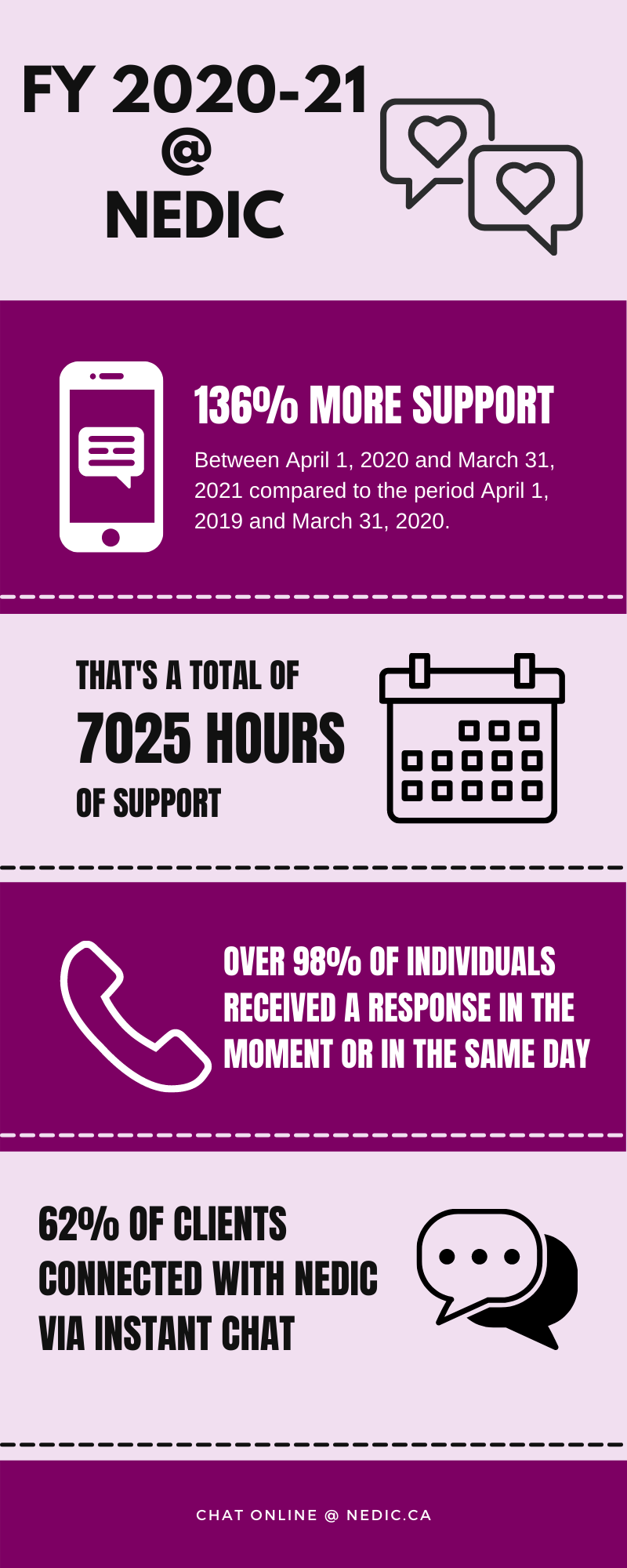
NEDIC Staff
May 18, 2021, 6:48 p.m.

NEDIC’s fiscal year runs from April 1 through March 31. When our last fiscal started, most of us had left the office two weeks before – and most of us have yet to return. One of us goes in each day to answer calls on the helpline, and the rest of us have been working remotely for well over a year. The pivot to virtual was rapid and intense. Before long, our Outreach and Education team was exploring Zoom and other options to continue delivering our critical workshops from a safe distance. The demand for engaging, interactive workshops only increased as people started to see the toll that mental health was having on everyone, especially youth.
Over the previous two summers, our dedicated outreach and education team had spent time with over 1,500 children and youth providing free education through our Body Pride for Camps initiative in city-run neighbourhood camps. In 2020, with COVID-19 imposing strict physical distancing restrictions that limited external community partners like us visiting for the safety of all campers, we had to adapt our programming. Mental health issues have often been named the ‘shadow pandemic’ compounding the devastating impact COVID-19 has had on our communities, and so more than ever, we wanted to make sure young people were learning about body image, critically examining the media, and the importance of inclusion and respect for all bodies. In August, we participated in virtual camp programming at Camp Mi-A-Kon-Da for campers across Ontario and mailed out resource packages for camp counsellors to facilitate activities in their local camps! For those at home, we released select pre-recorded camp activities that could be adapted for the home environment. In schools, virtual learning presented an opportunity for our team to be streamed into classrooms and campuses across the country and interact with people in new ways, fully taking advantage of the comfort and accessibility of an online medium to have destigmatizing conversations on eating disorder risk factors. In total, our Outreach & Education team has delivered our presentations to people in seven provinces and one territory!
Meanwhile, our helpline had never been busier. Even with reduced hours, we still saw an increase of over 70% in volume. The demand for instant chat had exploded, and we saw an increase of over 100% over the past year. We provided 136% more hours of chat support than we had in the previous fiscal – a total of 7025 hours. It was clear to us that our clients were struggling. We heard from many clients who had been doing well in their recovery for years, but had experienced a relapse as their regular routines collapsed. Similarly, many clients were reaching out to us for the first time, having only now been able to identify that their eating was disordered. Clients were experiencing more severe symptoms, and finding that treatment avenues were cut off, leaving them feeling adrift and scared. Many programs experienced shutdowns or service reductions so that staff could be redeployed to COVID-19 work. Other programs and providers pivoted to virtual offerings and were met with incredible demand. For our clients, the program closures and wait lists represented a devastating setback just when they had decided they were ready to seek treatment. It was clear to us that our clients were suffering, especially the youth. The clients reaching out to us were often younger and sicker than we had seen in previous years, and the “Helping Your Child” page on our website saw a 185% increase in traffic.
Two months into this fiscal, demand for our services does not appear to be lessening. Our clients are still struggling, and still facing setbacks, including extensive wait lists in both the public and private sectors. Although Canada is making headway in the fight against COVID-19 as vaccinations become more widely available, the “shadow pandemic” of mental illnesses, especially eating disorders, continues to present real challenges. It is heightened now, as many programs are still closed or virtual-only, and providers in both sectors typically have extensive wait lists, at a time when many people are anticipating an imminent return to “normalcy”, possibly in bodies which look very different to the ones they inhabited pre-pandemic. NEDIC’s role as the connection between community and care remains vital as we offer information, referrals, resources, and support to folks living with eating disorders and the people who love and care for them. Your support helps ensure we’re there when clients need us.